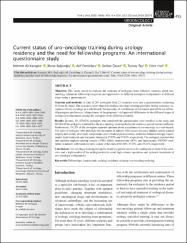Current status of uro-oncology training during urology residency and the need for fellowship programs: An international questionnaire study
Özet
Objective: This study aimed to evaluate the opinions of urologists from different countries about urooncology education, fellowship programs, and approaches to different urological malignancies at different stages using a questionnaire. Material and methods: A total of 207 urologists from 22 countries were sent a questionnaire containing 18 items by email. The questions were related to urologic oncology training provided during residency, acceptance of uro-oncology as a sub-branch, the necessity of certification for treatment and follow-up, fellowship program preferences, adequateness of the programs, and approach differences to the different stages of urological malignancies among the urologists from different countries. Results: In total, Ill (53.62%) urologists who completed the questionnaire were enrolled in the study, and 40.54% of the urologists reported that the uro-oncology training during the residency period was not sufficient. Furthermore, 79.27% of the urologists reported opinions about acceptance of uro-oncology as a sub-branch. The ratio of urologists who undertake the treatment of patients with muscle-invasive bladder cancer (radical surgery and urinary diversion) and prostate cancer (radical prostatectomy, definitive radiation therapy, experimental local treatment, and hormonal therapy) is 27.92% and 37.83%, respectively. The urologists reported that they perform nephron-sparing surgery (NSS), radical nephrectomy (RN), and laparoscopic NSS/RN treatments in patients with localized renal cancer at the rates of 61.26%, 47.74%, and 25.22%, respectively. Conclusion: Uro-oncology training during the residency period seems to be inadequate in most of the countries, and a high number of the urologists tend to avoid high-volume operations and systemic treatments of uro-oncologic malignancies.
















